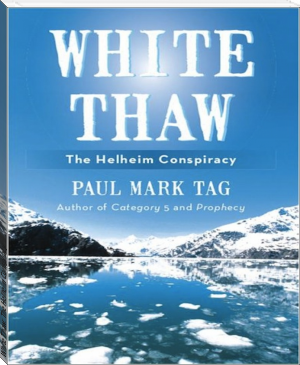White Thaw: The Helheim Conspiracy by Paul Mark Tag (beginner reading books for adults txt) 📕

- Author: Paul Mark Tag
Book online «White Thaw: The Helheim Conspiracy by Paul Mark Tag (beginner reading books for adults txt) 📕». Author Paul Mark Tag
Book Excerpts, White Thaw: The Helheim Conspiracy
Paul Mark Tag
The following excerpt is from Chapter 4, early in the book. My protagonist, Linda Kipling, discovers that there are secrets in her family, secrets that have serious implications. This scene occurs at the Pennsylvania Hospital in Philadelphia, Pennsylvania. It is 3:15 in the morning.
Linda Kipling tried not to think about her father’s words from the day before. Instead, she concentrated on memories, so many good ones. Standing by his bedside, she brushed the white hair from his forehead to see if the scar was still visible. Yes, there it was. It had caused him so much embarrassment in the years following her birth.
Kipling watched as a nurse checked the various monitors and tubes attached to her father’s body. Several hours earlier, his doctor said that it wouldn’t be much longer. She held his hand and willed her love through the frail fingers, straight to the heart of Winston Kipling.
Kipling had been a late-in-life gift to her parents. When Linda reached her teenage years, her mother explained that she and her husband both had had reproductive issues that impaired conception. They should forget the idea of a child of their own, their doctor told them. And they did. When Inge’s period stopped suddenly at the age of forty-one, she figured that menopause had struck early.
Two months later, when bodily changes made her realize that something was amiss, she hurried to her doctor. Afterward, Inge rushed into the house to give her husband the news that they were going to be parents. He fainted straightaway, banging his head against the coffee table, producing a wound that required six stitches to close. Inge loved to tell that story. And every time, Winston would wince and say, “That’s the last time you tell that story, Inge.” Of course, it never was.
Kipling blinked. She had expected more drama. The shrill sound of the monitor meant that it was over. She had not seen it coming; it was all so anticlimactic. His chest had simply stopped moving. She bent down with her ear next to her father’s open mouth, a tear about to drip from her eye. No sound, no movement of air. She kissed him on the cheek.
The nurse silenced the equipment and offered a sympathetic glance. For a few moments, Kipling stood silent, alone in her private thoughts. Her father had always said that he hoped his wife would die first. When asked why, he said, “I love Inge, and she loves me. Because I know that for a fact, it would be extremely hard for her if I died first. For that reason, I hope that she is the first to go.” Her father had gotten his wish the previous spring. But inherent in that selflessness was the mirrored consequence that the same pain he had spared his wife he had taken on himself. Perhaps that was why he lasted only another six months.
Kipling took one last look, gathered up her father’s few belongings, and left the room. The personnel at the nurses’ station offered their condolences. Taking the elevator down, she headed toward the exterior doors. She willed her way forward, suddenly realizing how exhausted she was. To the left, she noted the plaque that she had passed for the past five days, boasting that this institution, the Pennsylvania Hospital, had been the first hospital in the United States. It had opened its doors to patients at this very location in 1756.
Kipling exited and collapsed on the bench outside. This was one of those times when an ordinary person would go home and medicate themselves with alcohol to deaden the pain and to drive the imbiber into an unconscious stupor. The trouble with that approach was that Kipling had an unusually high tolerance for chemicals, including alcohol. If the bottle of ibuprofen said to take two pills to alleviate the occasional headache, Kipling took eight. She had identical reactions to barbiturates and other drugs.
With the cool night air enveloping her body, she sobbed softly, the lone descendant of the man on the third floor. Spontaneously, she looked at her watch and took out her cell phone. Rational thought took over, and she abandoned that idea. This delicate situation required more thought. And what would she have said? Further, should she say anything at all?
Kipling rose and plodded toward her rental car. As much as she had been trying not to think about them, her father’s final words were too extraordinary to set aside. He said that it had not been an easy decision to make, but he had decided that his daughter needed to know her heritage. What he told her was that Inge’s father, Hans Müller, Kipling’s grandfather, had been a prominent Nazi during World War II. He had spirited his family, including Inge and her new husband, to Brazil in 1945.
Kipling had known that her descendants hailed from Germany, but she thought they had gone to South America sometime after the war. Several years later, Winston and Inge emigrated again, this time to the United States where Winston had family who had come from England in the 1930s. Hans Müller and the rest of his family chose to remain in Brazil, although they later changed their minds about staying there too.
Kipling inserted her key into the door of the rental car and then paused to stare up into the night. Although her father’s revelations would take time to accept, she saw no reason to remember her parents any differently. Her father had said that he and his wife were horrified to learn the extent of Hitler’s crimes against humanity. As had most of the German population, they had known nothing.
Kipling pulled open the door and shuddered. It wasn’t her family’s Nazi past that gave her pause. It was the other information her father had revealed, facts that he swore were true, which were far more disturbing.
This scene occurs when Kipling’s cousins (Dieter and Axel Müller ) have just completed a lie detector test on Kipling. They are desperate to determine if she is telling the truth when she agrees to help them with their maniacal plan to alter the world’s climate in Greenland. Schnabel is the Müllers’ hired gun, and Wagner performed the earlier test.
Some time had gone by, and Kipling was worried. Had she failed the test? That was unlikely. From her experience at the Park Service, she knew that she could fool the machine.
Finally, the door opened. Dieter, Axel, and Schnabel followed Wagner. Behind them, a fifth man, unknown to Kipling, entered, carrying a leather satchel and a metal contraption. The satchel was similar to what she’d expect a country physician to carry on house calls.
Kipling addressed her question to Dieter, her arms trying to gesture but held in place by the biological tethers. “Did I fail? I answered as truthfully as I could,” she said sincerely.
“No, you didn’t fail, but the test wasn’t as conclusive as we’d hoped.”
Are they playing games with me? “Maybe we should do it again. I’ve never done anything like this before. I was nervous.”
“Linda, as you know, this is very important to us. Unless we can trust you one hundred and ten percent, we have a problem. But we have a suggestion, another testing method that we’ve used before. We’d like your permission to give it a try.”
Interesting! From what Kipling had read in the news, there was a new way that involved MRI imaging that had shown promise, wherein portions of the brain lit up differently when the subject lied. It was unlikely the Müllers had anything that sophisticated. It took only an instant more to realize what they had in mind. The man with the black bag provided the clue.
Kipling did not hesitate. “Anything you want to do is okay with me. Let’s get on with it. I’ve got a ticket to ride, and I don’t want to miss the plane.” She smiled demurely.
“Linda, I want you to meet Dr. Fiedler. He will explain everything to you.” Dieter beckoned to his rear.
Fiedler stepped in front of the others. Kipling had never seen a photograph of Josef Mengele, the Auschwitz physician who had performed unimaginable atrocities on sets of twins. But she imagined that central casting could have chosen this man for the part.
“Hello, Ms. Kipling. I am Leon Fiedler. I’m a physician. I am here because I have been asked to help determine if you are telling the truth.”
Kipling played along. “I want to prove that more than anything.”
“Have you ever heard of truth serum?” Fiedler opened his case and withdrew a syringe and a vial.
Kipling’s eyes darted among the faces in the room. They landed finally on Dieter, and she chuckled nervously. “I’ll do whatever you want, but please don’t kill me.” She addressed Fiedler. “I say this because you need to know that I respond very easily to any kind of drug. If you have a headache, and it takes two aspirin to make it go away, for me it’ll only take half of one aspirin.”
Fiedler nodded dramatically. “It’s good that you told me that. Don’t be afraid.” He took the syringe, inserted it into the bottle, and withdrew some liquid.
Again, on purpose, Kipling appeared nervous. I have to play along. She watched as Fiedler unfolded the metal contraption. It would hold a saline bag for a drip. “What do you want me to do?”
“The beauty with this method is that you don’t have to do anything.” Fiedler smiled out of the corner of his mouth. “You’re still hooked up to our sensors.” He pointed to Wagner, who had returned to his laptop, punching keys. “Don’t worry. Basically, you’re going to go to sleep. Once you’re asleep, we’ll ask you questions. This won’t take long, and you’ll be fine. I promise.”
Kipling flinched visibly as Fiedler’s IV needle pierced a vein in her arm. After making sure that the saline solution flowed properly, Fiedler injected the contents of the syringe into the plastic line.
In this final scene near the end of the book, Kipling has gone to Greenland, determined to bring down her cousins’ operation and save the world from catastrophe. Because she needs to surreptitiously alert her colleague, Victor Silverstein, of her geographic location in order to bring in military force, she is headed to the communications room, intending to convince August Wolf to let her use the phone.
The door ahead had a window, and Kipling could see light. She opened the inner pocket to her jacket, removed the Makarov, loaded one of the eight-cartridge magazines, and made sure she pushed the safety into the fire position. She transferred the weapon to her right outside pocket but with the zipper open.
Kipling arrived at the door and opened it. The room she entered was smaller than she had imagined. A large radarscope straight ahead caught her eye. Along the right wall was a series of television screens displaying images from outside. In the fading light, she saw the dead police officers and the helicopter, with its overhead rotor still turning.
Kipling had startled Wolf, who was leaning over his desk along the far wall. With both hands in her pockets, she had her speech prepared. She would convince him to let her call Silverstein.
“I’m sorry that we haven’t formally met.” Kipling smiled sweetly. “I’m Linda Kipling. I’m the Müllers’ cousin from America. I didn’t mean to just barge in on you, but things are a bit hectic back there.” She motioned toward the door. “Gunter told me to come see you. He said that it would be okay to call my boyfriend back home.”
Wolf’s





Comments (0)